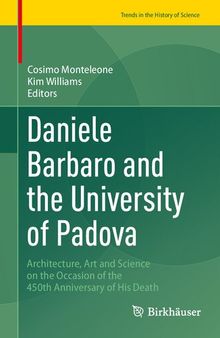 جزییات کتاب
جزییات کتاب
This book, edited by Kim Williams and Cosimo Monteleone, follows the publication of two other books dedicated to Daniele Barbaro and published by Springer: Daniele Barbaro's Vitruvius of 1567 (Kim Williams, 2019) and Daniele Barbaro's Perspective of 1568 (Kim Williams and Cosimo Monteleone, 2021). Therefore, it can be considered another installment in a series that has deepened the scientific treatises published by Daniele Barbaro. Due to the numerous scientific interests that Barbaro matured in the years he spent at the University of Padua, we have invited experts in these topics to discuss Barbaro in relation to his training. In particular, the book opens with the essays of the two editors to frame its general theme in relation to mathematics. Cosimo Monteleone addressed the relationship between Barbaro's perspective theory with Euclid's optics, the Aristotelian process of knowledge and the ophthalmological discoveries of the University of Padova in the Renaissance. Kim Williams underlines how Barbaro's arithmetic and geometry established `the most certain sciences' and set the base of the `primary sciences'. A series of essays concerning Barbaro's training at the University of Padua complete the theoretical framework analyzed by the two editors. These studies embrace the following subjects: mathematical instruments (Filippo Camerota), astronomy and sundials (Cristiano Guarneri), mathematics, geometry and polyhedral (Vera Viana), perspective and anamorphosis (Agostino De Rosa), botany and the foundation of the botanical garden (Stefano Zaggia), Vitruvius' architecture (Ekaterina Igoshina, Ilya Anikyev, Anna Markova) and Aristotelianism (Branko Mitrović). A foreword by Xavier Salomon sets the stage for this book, outlining the innovations that Barbaro brought to scientific knowledge.Barbaro's scientific efforts are sometimes dismissed in recent studies as a compilation of known principles. The aim of this present book is to reveal the truly innovative nature of Barbaro's experiments and results and restore him to his rightful place as an original scholar of Renaissance.



 دانلود کتاب
دانلود کتاب

 جزییات کتاب
جزییات کتاب





 این کتاب رو مطالعه کردید؟ نظر شما چیست؟
این کتاب رو مطالعه کردید؟ نظر شما چیست؟
